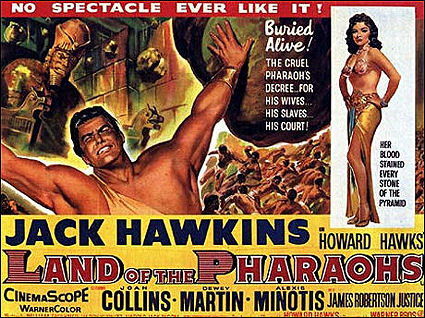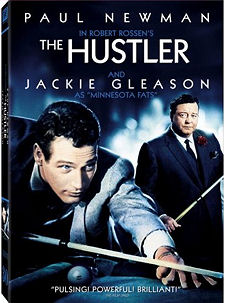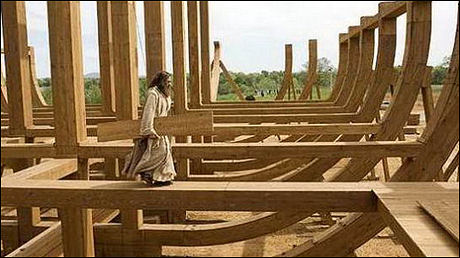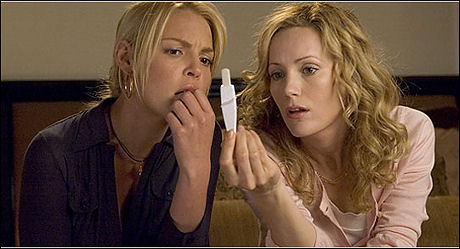Some fairly, rich, down-to-it dialogue from Straight Time, between Dustin Hoffman and Theresa Russell. Whenever I’ve thought of this film over the last 20-plus years, I’ve thought of this scene.
wired
Sepinwall talks to Chase
Sometime recently (i.e., apparently after Sunday night’s Sopranos finale, which indicates yesterday), the Newark Star Ledger‘s Alan Sepinwall spoke to Sopranos creator David Chase in France, “where he’s fled to avoid ‘all the Monday morning quarterbacking’ about the show’s finale.”
Following this interview, Sepinwall writes, “Chase intends to go into radio silence, letting the work — especially the controversial final scene — speak for itself.
Except it doesn’t speak for itself. Not in any commonly decipherable sort of way. If it did there wouldn’t be so many thousands of people arguing what happened in that last scene. So let’s call a spade a spade: Chase is a gifted filmmaker who talks like a straight-shooter when in fact he’s an artful dodger and a bit of a film-flammer. (No offense, Chase, if you’re reading this.)
There is, however, one possible major “tell” in Sepinwall’s piece. Chase says one problem in doing a movie version is that “over the last season Chase [as] killed so many key characters.” Chase, says Sepinwall, “has toyed with the idea of ‘going back to a day in 2006 that you didn’t see, but then (Tony’s children) would be older than they were then and you would know that Tony doesn’t get killed. It’s got problems.”
Is Chase saying what I think he’s saying — that Tony “doesn’t get killed” and therefore wasn’t killed two nights ago?
“‘I have no interest in explaining, defending, reinterpreting, or adding to what is there,’ Chase says of the final scene.
“‘No one was trying to be audacious, honest to God,’ Chase adds. ‘We did what we thought we had to do. No one was trying to blow people’s minds, or thinking, ‘Wow, this’ll piss them off.’ People get the impression that you’re trying to fuck with them and it’s not true. You’re trying to entertain them.’
In Sunday night’s final scene, Tony Soprano waited at a Bloomfield ice cream parlor for his family to arrive, one by one. What was a seemingly benign family outing was shot and cut as the preamble to a tragedy, with Tony suspiciously eyeing one patron after another, the camera dwelling a little too long on Meadow’s parallel parking and a man in a Members Only jacket’s walk to the men’s room.
Just as the tension had been ratched up to unbearable levels, the series cut to black in mid-scene (and mid-song) with no resolution.
“‘Anybody who wants to watch it, it’s all there,’ says Chase, 61, who based the series in general (and Tony’s relationship with mother Livia specifically) on his North Caldwell childhood.
“Some fans have already assumed that the ambiguous ending was Chase setting up the oft-rumored Sopranos movie, but that doesn’t seem to be in the cards.
“‘I don’t think about (a movie) much,’ he says. ‘I never say never. An idea could pop into my head where I would go, ‘Wow, that would make a great movie,’ but I doubt it.
“I’m not being coy,” he adds. “If something appeared that really made a good Sopranos movie and you could invest in it and everybody else wanted to do it, I would do it. But I think we’ve kind of said it and done it.”
Tony was hit
“I’ve never sat through an entire episode of The Sopranos, but in watching the final four minutes of last night’s episode or so on YouTube [editor’s note: clip was just removed by HBO for copyright violation], Tony was hit. Period. Based on pure filmic language, that’s how it reads.
“If you have a character at the bar who keeps looking over, then he walks to the bathroom and the camera dollies to reveal the bathroom is just off to Tony’s side, providing the geography and the logistics. And there’s your answer. This show always had a very formal aesthetic, and this dolly was motivated.
“The abrupt cut to black was it. That’s how it happens in the mob, as per Goodfellas — no yelling, no nothing, it just happens.” — Video artist Jamie Stuart to Hollywood Elsewhere, received 6:15 pm, 6.11.07.
“Pharoah” DVD
I’ve always gotten a goofy kick out of Howard Hawks‘ Land of the Pharoahs (1955), which has an upcoming 6.26 DVD release. One reason is that a presumably half-drunk William Faulkner helped write the script. I don’t know of any eyewitness accounts of Faulkner’s behavior during this period, but if you were Faulkner wouldn’t you booze it up if you were stuck writing an ancient Egyptian costume flick?

Here are four more reasons: (1) those slinky bikini-harem costumes worn by costar Joan Collins (only 21 at the time of filming, and allegedly referred to in mid ’50s industry circles as “the British Open”), and the way Jack Hawkins, as the Pharoah Khufu, tears off her covering veil in an early scene, (2) Dimitri Tiomkin‘s grandiose, slam-bang musical score, (3) Hawkins’ tough-guy performance as an arrogant man of action, and (4) the finale that has a crying, screaming Collins (“I don’t want to die!”) realizing she’s been tricked into being buried alive inside Khufu’s pyramid.
Tony and family got hit?
HE reader Roy Batty has convinced me that Tony Soprano got hit last night, and possibly his whole family along with him. Seriously. None of us except Batty and (I presume) a few others were sharp enough to decipher the meaning — a very obvious one, in Batty’s view — of what we saw. Here’s his explanation:
“Just how closely did people who call themselves fans pay attention last night? The writing is not only on the wall — it’s on the floor, the ceiling and fluttering from a banner over the entrance: Tony and probably the family got hit.
“I didn’t think so just after it had ended, believing like many that David Chase had simply set up some sort of bullshit ambiguous ending to engender debate. I argued that had something happened, we would not have seen Meadow enter the diner. And that she was meant, as the person least connected to Tony’s blood money, to survive because of her distance from the family.
“But I was just going on surface information and not really considering all the things that make it impossible to ignore. While most are in the form of metaphors and callbacks to past characters, the single biggest signpost that is a virtual headstone is the flashback to Bobby and Tony in the boat talking about what it’s like to be killed.
“Bobby says you don’t see it coming and it’s just over. The show then ends with a ‘smash cut’ to black. It doesn’t get any clearer than that.
“I think too many people are pissed that Chase didn’t end it the way they had written in their minds or hate the idea that Tony, et. al. are gone. I don’t know if it was brilliant, but not seen through glasses of denial it’s pretty clear.”
“The Hustler” again
How much better can you make a 1961 black-and-white CinemaScope film look? I’ve always loved Robert Rossen‘s The Hustler (particularly that revolutionary opening-credit sequence), and I would probably buy a Blu-Ray DVD of it. (That is, if I had a Blu-Ray player and a first-rate high-def monitor.) But what could I possibly expect to get from this brand-new double-disc DVD get that would amount to a genuine visual upgrade?

Moore vs. Bush’s OFAC
It’s been claimed that Michael Moore‘s criticism of the Bush administration’s health-care politicies may have prompted a federal investigation into his trip to Cuba for the upcoming health-care documentary, Sicko. In a letter to the U.S. Treasury Department’s Office of Foreign Assets Control, attorney David Boies noted that Moore has been a constant Bush critic for years, and “for this reason, I am concerned that Moore has been selected for discriminatory treatment by your office.” This is…what, a hypothesis? As in “this may have been the case”?
Van Sant’s “Acid Test”
Right off the bat, a line in Michael Fleming‘s story about Gus Van Sant‘s yet-to-be-written adaptation of Tom Wolfe’s The Electric Kool-Aid Acid Test gives pause. I’m speaking of the Variety columnist writing that “it’s likely Wolfe will not be a major character in the film, which will focus on Kesey and include events that occurred after the road trip.”
Sorry, but this falls under the heading of a Big Mistake. If you’re going to make a film that’s mainly about a bunch of visionary free spirits ripped on acid and driving a psychedelic bus around the country, you need an against-the-flow punctuation character — a dispassionate overview guy wearing a suit and taking notes and not dropping tabs. Obviously! Anyone who knows the first thing about writing ensemble pieces will tell you this.
Because the entire universe is contained in every blade of grass, I’m afraid the Wolfe deletion is a serious stopper for Van Sant’s Kool-Aid project. Without a Wolfe character the film will be a little too Even Cowgirls Get The Blues. Too crazy-60s monotonous, too indulgent-flamboyant. Ken Kesey this, Neil Casady that, etc. Bring in Wolfe and we’ll talk but without him, forget it.
“Evan Almighty” reaction
Evan Almighty (Universal, 6.22) had a big family-style premiere and after-party on the Universal lot last weekend, and a friend who attended says “it’s funny and entertaining, but it’s basically a pro-environment rip on the Republicans and — if you want to take it this far — the self-serving politicians who didn’t build the New Orleans levees properly, which is what made Hurricane Katrina so devastating.

There’s a third-act plot spoiler coming three paragraphs from now…fair warning.
“Kids and families will love it, the special-effects are great, and It’s just a really nice alpha-vibe, do-good, love-the-earth movie. The theme of the movie is ‘ark’ — acts of random kindness.
“Steve Carrell is very funny and Morgan Freeman delivers his usual smooth professional job, but they gave all the best laugh lines – disbelieving skeptical reacton lines — to Wanda Sykes, a black comedienne. There’s a funny visual riff on one of Carell’s earlier films, but I won’t tell you what it is. This is only a 90 minute movie, by the way, which makes it even more kid-friendly, or tyke-friendly.
SPOILER: Freeman’s God calls upon Carell’s Congressman to build the ark to prepare for the big rains on September 22nd.” (Why that date in particular?) “And then the rains come and then…perhaps I shouldn’t say. Suffice that the real focus of this film isn’t God’s wrath but Man’s greed. It turns out there’s been a man-made dambreak that causes this gigantic flood, and it’s mainly the fault of a pro-business Congressman played by John Goodman who’s been helping his fat-cat pallies buy lots of land in parks and then winking at their short-cut moves (i.e., not building a dam properly).
“This movie is a throwback to the Oh, God movies,” the observer says. “The end result is always that the main character — Carrell’s, in this instance — becomes enlightened.”
Hilton talks to Walters
“I know now that I can make a difference, that I have the power to do that. I have been thinking that I want to do different things when I am out of here. I have become much more spiritual. God has given me this new chance.” — An incarcerated Paris Hilton speaking to Barbara Walters in a Sunday afternoon (6.10) phone interview.
Have splatter-horror films lost their bite?
Did the measley $8.8 million earned by Hostel, Part II “put a nail in the coffin of a dying horror boom last weekend,” as N.Y. Times guy Michael Ciepley contends? Did the moral revulsion factor (i.e., which I realize doesn’t apply as far as Las Vegas-residing Hispanic mothers with 15 month-old daughters are concerned) have at least something to do with this?
Abortion is a Hollywood no-show
If I were Katherine Heigl and I’d just discovered I’ve been impregnated by a beefy, no-account slacker like Seth Rogen, I would run, not walk, to the nearest recommended abortionist. But of course, as N.Y. Times writer Mireya Navarro points out, this option doesn’t exist in mainstream films like Knocked Up and Waitress.

“Though conservatives regularly accuse Hollywood of being overly liberal on social issues, abortion rarely comes up in film,” she writes.
“Real-life women struggling with unwanted pregnancies might consider an abortion, have intense discussions with partners and friends about it and, in most cases, go through with it. But historically and to this day in television and film — historians, writers and those in the movie industry say — a character in such straits usually conveniently miscarries or decides to keep the baby.
